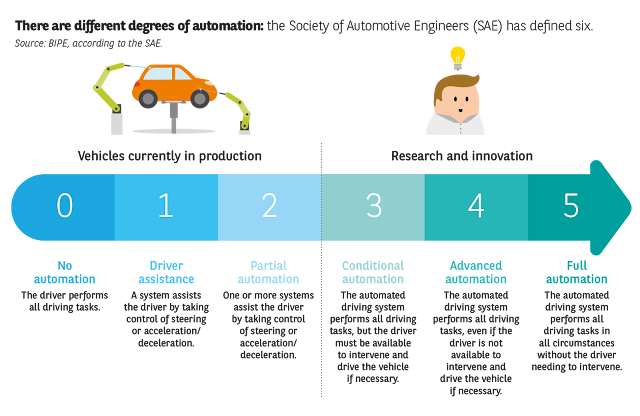1 – Introduction
#SAE International has a formal classification system for autonomous vehicles, ranging from level 0 (not automated) to level 5 (fully automated), specificly:
Level 0 (No automation): The car is totally controlled by the drivers . But there can be some
warning systems (blind-spot and collision warnings).
Level 1 (Driver assistance): In this level, vehicles can handle one task such as steering, throttle,
or braking, but not in all circumstances, and the driver must be ready to take
over those functions if called upon by the vehicle.
Level 2 (Partial assistance): The car can handle much more than one task( steering, throttle, and braking ) but immediately let the driver take
over if he detects objects and events the car is not responding to: the surroundings,
traffic, weather, and road conditions.
Level 3 (Conditional assistance): The car monitors
surroundings and takes care of all steering, throttle, and braking in certain environments, such as
freeways. But the driver must be ready to intervene if the car requests it.
Level 4 (High automation): The car handles steering, throttle, and braking and
monitoring the surroundings in a wider range of environments except for severe weather. The driver switches on the automatic driving only when it is
safe to do so. After that, the driver is not required.
Level 5 (Full automation): With driver's setting, the car can drive by itself. There may be no control of the drivers.

This figure is a summary of both SAE and NHTSA levels of driving automation.
# Examples of autonomous vehicle and its classification:
1. Volvo XC90
The Second Generation Volvo XC90 SUV features a comprehensive and technologically sophisticated standard safety package (IntelliSafe), including two world first safety technologies: Run-off-road protection package and Auto brake at intersection.Run-off-road protection package: In a run-off-road scenario, the all-new Volvo XC90 detects what is happening and the front safety belts are tightened to keep the occupants in position. To help prevent Spinal cord injury, energy-absorbing functionality between the seat and seat frame cushions the vertical forces that can arise when the car encounters a hard landing in the terrain.
Auto brake in intersections:The XC90 is the first car in the world with technology that features automatic braking if the driver turns in front of an oncoming car.This is a common scenario at busy city crossings as well as on highways, where the speed limits are higher.
Adaptive Cruise Control with Pilot Assist traffic jam assistant enables safe and comfortable semi-autonomous driving by automatically following the vehicle ahead in stop-and-go traffic. Acceleration, braking and now also steering are controlled automatically.
There have been over 100 tests involing in auto pilot system in real, and the software still rare and it is hard to evaluate how the system works.
With Volvo's function, it can be classed in the level 2 of SAE levels of driving automation: partial assistance (more than a driver assistance systems).


2. Olli:
"Olli is a self-driving electric vehicle designed to
streamline shared transportation systems around the world. As long as you have
a smartphone, wherever you are is a bus stop. And wherever you’re going is the
next stop.
Responsive.
Sensitive. Supervised. Symbiotic. Stylish. Those are just a few words that come
to mind when describing Olli.
RESPONSIVE: Self-driving software allows Olli to make
decisions faster than a human and keep everyone safe.
SENSITIVE: Lidar and optical cameras allow Olli to see in
all directions.
SUPERVISED: Olli's activity and the safety of riders are
monitored by a human at all times.
SYMBIOTIC: Olli's electric drivetrain protects our
environment while providing a quite ride for passengers.
STYLISH: Olli's exterior is customizable, allowing for a
look to to reflect the style of riders, city, or campus." (https://localmotors.com/olli/)
Therefore, Olli is in the level 4 and the vehicles have already been tested in Maryland and avoided accidents during trials, despite facing additional stress tests from pranksters.
Taking self-driving vehicles to the next level, Olli is ready to get to work, as soon as regulations allow it.

#3 possible applications for autonomous vehicles:
- Auto earn money in free time: Driveless vehicles can do a different task besides taking the owners to places automatically. In free time that the owners do not use autonomous vehicles, they can let the vehicles pick up/drive other people who have demand in travelling through some setting and program.This is similar to the Uber but the owners do not have to control the vehicle by themselves. Therefore, having an autonomous vehicle not only benefits people's requirement, but also helps people in earning money.
- Auto charge: If the vehicles realize that they are going to run out of energy, they can auto get to the nearest destination to charge and then come back to work. People can avoid the situation that the vehicles stop in the middle way because lack of power.
- New ways to entertain: Because people no longer pay all their attention to drive when use autonomous vehicles. During the trip, people need to reduce the stress, pressure and recover their health. Itunes, TV channels, massage seats,etc.. will make people feel more comfortable and enjoy the trip.


Textual copy without citation, i.e. "Olli is a self-driving electric vehicle designed to streamline shared transportation systems around the world. As long as you have a smartphone, wherever you are is a bus stop...."
ReplyDeleteBe careful with these type of publication, proper citation of other author's work is necessary.